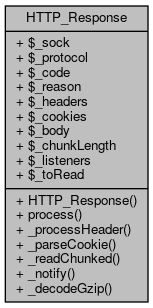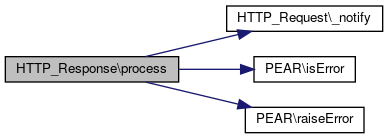 Collaboration diagram for HTTP_Response:
Collaboration diagram for HTTP_Response:Public Member Functions | |
| HTTP_Response (&$sock, &$listeners) | |
| Constructor. More... | |
| process ($saveBody=true, $canHaveBody=true) | |
| Processes a HTTP response. More... | |
| _processHeader ($header) | |
| Processes the response header. More... | |
| _parseCookie ($headervalue) | |
| Parse a Set-Cookie header to fill $_cookies array. More... | |
| _readChunked () | |
| Read a part of response body encoded with chunked Transfer-Encoding. More... | |
| _notify ($event, $data=null) | |
| Notifies all registered listeners of an event. More... | |
| _decodeGzip ($data) | |
| Decodes the message-body encoded by gzip. More... | |
Data Fields | |
| $_sock | |
| $_protocol | |
| $_code | |
| $_reason | |
| $_headers | |
| $_cookies | |
| $_body = '' | |
| $_chunkLength = 0 | |
| $_listeners = array() | |
| $_toRead | |
Detailed Description
Definition at line 1130 of file Request.php.
Member Function Documentation
◆ _decodeGzip()
| HTTP_Response::_decodeGzip | ( | $data | ) |
Decodes the message-body encoded by gzip.
The real decoding work is done by gzinflate() built-in function, this method only parses the header and checks data for compliance with RFC 1952
@access private
- Parameters
-
string gzip-encoded data
- Returns
- string decoded data
Definition at line 1433 of file Request.php.
References $data, HTTP_REQUEST_ERROR_GZIP_CRC, HTTP_REQUEST_ERROR_GZIP_DATA, HTTP_REQUEST_ERROR_GZIP_METHOD, HTTP_REQUEST_ERROR_GZIP_READ, and PEAR\raiseError().
Referenced by process().
 Here is the call graph for this function:
Here is the call graph for this function: Here is the caller graph for this function:
Here is the caller graph for this function:◆ _notify()
| HTTP_Response::_notify | ( | $event, | |
$data = null |
|||
| ) |
Notifies all registered listeners of an event.
- Parameters
-
string Event name mixed Additional data @access private
- See also
- HTTP_Request::_notify()
Definition at line 1414 of file Request.php.
References $data.
Referenced by process().
 Here is the caller graph for this function:
Here is the caller graph for this function:◆ _parseCookie()
| HTTP_Response::_parseCookie | ( | $headervalue | ) |
Parse a Set-Cookie header to fill $_cookies array.
@access private
- Parameters
-
string value of Set-Cookie header
Definition at line 1330 of file Request.php.
Referenced by _processHeader().
 Here is the caller graph for this function:
Here is the caller graph for this function:◆ _processHeader()
| HTTP_Response::_processHeader | ( | $header | ) |
Processes the response header.
@access private
- Parameters
-
string HTTP header
Definition at line 1303 of file Request.php.
References $header, and _parseCookie().
Referenced by process().
 Here is the call graph for this function:
Here is the call graph for this function: Here is the caller graph for this function:
Here is the caller graph for this function:◆ _readChunked()
| HTTP_Response::_readChunked | ( | ) |
Read a part of response body encoded with chunked Transfer-Encoding.
@access private
- Returns
- string
Definition at line 1381 of file Request.php.
References $data.
Referenced by process().
 Here is the caller graph for this function:
Here is the caller graph for this function:◆ HTTP_Response()
| HTTP_Response::HTTP_Response | ( | & | $sock, |
| & | $listeners | ||
| ) |
Constructor.
- Parameters
-
Net_Socket socket to read the response from array listeners attached to request
Definition at line 1198 of file Request.php.
◆ process()
| HTTP_Response::process | ( | $saveBody = true, |
|
$canHaveBody = true |
|||
| ) |
Processes a HTTP response.
This extracts response code, headers, cookies and decodes body if it was encoded in some way
@access public
- Parameters
-
bool Whether to store response body in object property, set this to false if downloading a LARGE file and using a Listener. This is assumed to be true if body is gzip-encoded. bool Whether the response can actually have a message-body. Will be set to false for HEAD requests.
- Exceptions
-
PEAR_Error
- Returns
- mixed true on success, PEAR_Error in case of malformed response
Definition at line 1220 of file Request.php.
References $_toRead, $data, $header, _decodeGzip(), _notify(), _processHeader(), _readChunked(), HTTP_REQUEST_ERROR_RESPONSE, PEAR\isError(), and PEAR\raiseError().
 Here is the call graph for this function:
Here is the call graph for this function:Field Documentation
◆ $_body
| HTTP_Response::$_body = '' |
Definition at line 1172 of file Request.php.
◆ $_chunkLength
| HTTP_Response::$_chunkLength = 0 |
Definition at line 1178 of file Request.php.
◆ $_code
| HTTP_Response::$_code |
Definition at line 1148 of file Request.php.
◆ $_cookies
| HTTP_Response::$_cookies |
Definition at line 1166 of file Request.php.
◆ $_headers
| HTTP_Response::$_headers |
Definition at line 1160 of file Request.php.
◆ $_listeners
| HTTP_Response::$_listeners = array() |
Definition at line 1184 of file Request.php.
◆ $_protocol
| HTTP_Response::$_protocol |
Definition at line 1142 of file Request.php.
◆ $_reason
| HTTP_Response::$_reason |
Definition at line 1154 of file Request.php.
◆ $_sock
| HTTP_Response::$_sock |
Definition at line 1136 of file Request.php.
◆ $_toRead
| HTTP_Response::$_toRead |
Definition at line 1190 of file Request.php.
Referenced by process().
The documentation for this class was generated from the following file:
- Services/PEAR/lib/HTTP/Request.php









